| Srl | Item |
| 1 |
ID:
016978
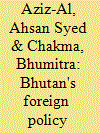

|
|
|
|
|
| Publication |
Nov 1993.
|
| Description |
1043-1054
|
|
|
|
|
|
|
|
|
|
|
|
|
|
|
|
| 2 |
ID:
165577
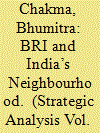

|
|
|
| 3 |
ID:
165581
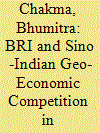

|
|
|
|
|
| Summary/Abstract |
This article explains the Sino-Indian geo-economic competition in Bangladesh in the wake of the former’s launching of the Belt and Road Initiative (BRI) in 2013. Beijing intends to fund various large-scale infrastructure projects in Bangladesh under the BRI which has prompted India to make its own offer of economic assistance to counter the Chinese initiative. The Sino-Indian competition has created challenges and opportunities for Bangladesh. Dhaka is pursuing a balanced policy to manage the competition and advance its own interests.
|
|
|
|
|
|
|
|
|
|
|
|
|
|
|
|
| 4 |
ID:
116299


|
|
|
|
|
| Publication |
2012.
|
| Summary/Abstract |
This article assesses the significance of American diplomatic intervention in the de-escalation of two South Asian nuclear crises - the 1999 Kargil conflict and the 2001-2002 military stand-off. The American role in those crises is often referred to as crisis manager or secondary in the context of the region's strategic and crisis stability. A careful analysis of American diplomatic interventions, however, reveals that the role is much greater, conceptualized here as deterrence diplomacy, meaning intense, focused diplomatic activity specifically to forestall crisis escalation and the outbreak of large-scale Indo-Pakistani war. More than is commonly realized, the United States was integral in the crisis strategies of both countries. It played a pivotal role preventing crisis escalation and the outbreak of large-scale conflict between India and Pakistan in both confrontations. And the American role was instrumental in the termination of those confrontations, particularly the Kargil conflict. Without America's effective deterrence diplomacy, any of the past South Asian crises could have escalated to the nuclear level. No global generalization can be made from this analysis because it is mostly South Asia specific. However, it is plausible to argue that the United States, as the key systemic power, will have an important role in future regional deterrence.
|
|
|
|
|
|
|
|
|
|
|
|
|
|
|
|
| 5 |
ID:
132905


|
|
|
|
|
| Publication |
2014.
|
| Summary/Abstract |
Following the end of the Cold War, South Asia has been in transition in a number of ways. Based on the Kantian tripod of democracy, economic interdependence and institution, this article assesses whether liberal peace has taken root in South Asia. It concludes that although an incipient liberal order may be discerned in the region, South Asia has yet to change fundamentally to become a zone of liberal peace. Particularly the Indo-Pakistani relationship remains frosty which constrains the building of a liberal order in the region.
|
|
|
|
|
|
|
|
|
|
|
|
|
|
|
|
| 6 |
ID:
067044
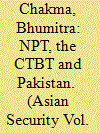

|
|
|
| 7 |
ID:
101079
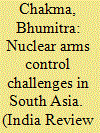

|
|
|
|
|
| Publication |
2010.
|
| Summary/Abstract |
The idea of arms control has hardly taken root in South Asia. The existing nuclear arms control measures between India and Pakistan are patently inadequate for addressing the pressing nuclear concerns of the region. Although there are compelling reasons for nuclear arms control, India and Pakistan are reluctant to undertake worthwhile arms control initiatives. There are three key reasons for this: India and Pakistan are currently at the formative phase of their nuclear force-building and at this stage they are unlikely to undertake arms control measures fearing that it may affect their future force-building plans; their intense political rivalry is unfavorable for successful arms control; the extra-regional links-the China factor-of South Asia's security dilemma hinders prospects for arms control in the region. Owing to these factors, the prospects for successful arms control between India and Pakistan are not great in the foreseeable future, although the question remains as to how long they can ignore the issue.
|
|
|
|
|
|
|
|
|
|
|
|
|
|
|
|
| 8 |
ID:
085262
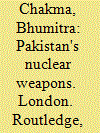

|
|
|
|
|
| Publication |
London, Routledge, 2009.
|
| Description |
xv, 187p.
|
| Standard Number |
9780415408714
|
|
|
|
|
|
|
|
|
|
|
|
Copies: C:2/I:0,R:0,Q:0
Circulation
| Accession# | Call# | Current Location | Status | Policy | Location |
| 054016 | 355.0217095491/CHA 054016 | Main | On Shelf | General | |
| 054048 | 355.0217095491/CHA 054048 | Main | On Shelf | General | |
|
|
|
|
| 9 |
ID:
160249
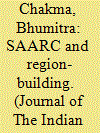

|
|
|
|
|
| Summary/Abstract |
Region’ is a contested concept. Although scholars have extensively debated the issue, there is no consensus on the definition of region. While some scholars emphasize geographic proximity as a key factor, others put importance to cognitive and ideational factors, yet some others seek to combine the two perspectives to define region. Against such a background, this paper explains the complexities of defining South Asia as a region. It explores the historical evolution of the identification of the region and analyses how region building in recent decades, instead of consolidating its regionness, has produced a multiplicity of discourses, narratives and meanings about South Asia as a region. This is particularly evident if South Asia is examined in terms of ‘economic,’ ‘security’ and ‘cultural’ region. Importantly, these discourses, narratives and meanings are not necessarily symmetrical and compatible with each other although they co-exist in an uneasy manner at both regional and national levels. And, they are contingent and subject to change over time.
|
|
|
|
|
|
|
|
|
|
|
|
|
|
|
|
| 10 |
ID:
092475
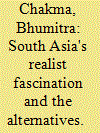

|
|
|
|
|
| Publication |
2009.
|
| Summary/Abstract |
An intense debate on the meaning and nature of security and security studies' into-logical and epistemological foundations is one of the defining features of post-Cold War international studies.
|
|
|
|
|
|
|
|
|
|
|
|
|
|
|
|
| 11 |
ID:
061819


|
|
|
|
|
| Publication |
Berlin, Perter Lang, 2004.
|
| Description |
xiii, 309p.
|
| Standard Number |
3039103822
|
|
|
|
|
|
|
|
|
|
|
|
Copies: C:1/I:0,R:0,Q:0
Circulation
| Accession# | Call# | Current Location | Status | Policy | Location |
| 049640 | 355.8251190954/CHA 049640 | Main | On Shelf | General | |
|
|
|
|